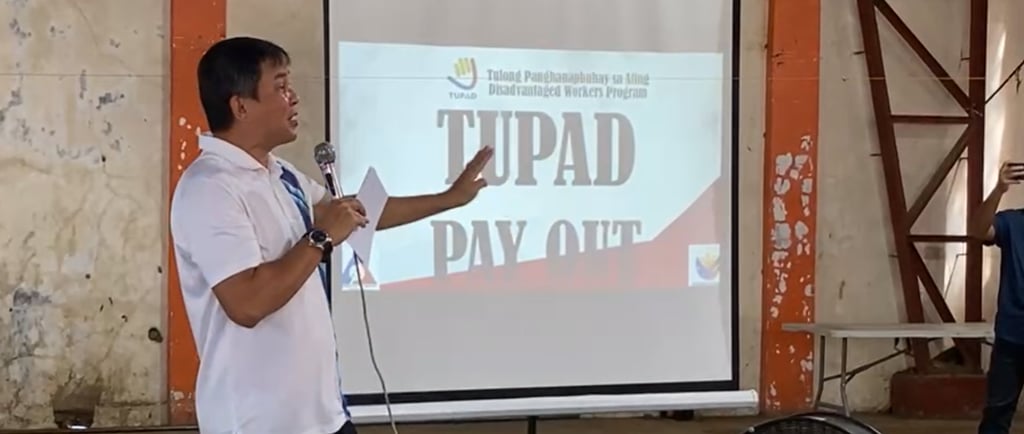The DOLE TUPAD Program: Bridging the Gap for Displaced Workers, Not for Political Grandstanding
THE EDITORIAL CHEESE
Patrick Petinglay Villavert
10/28/20253 min read


The COVID-19 pandemic brought unprecedented challenges to the global workforce, leaving millions displaced, underemployed, or without a source of income. In the Philippines, the Department of Labor and Employment (DOLE) stepped forward with a crucial lifeline: the Tulong Panghanapbuhay sa Ating Disadvantaged/Displaced Workers (TUPAD) Program. More than just emergency relief, TUPAD offers temporary employment, providing dignity through work and a direct injection of cash into the hands of those who need it most.
What is TUPAD?
TUPAD is a community-based package of assistance that provides emergency employment for a minimum of 10 days, but not more than 30 days, to disadvantaged workers. These include:
Underemployed: Those working fewer hours than they desire or in jobs that do not fully utilize their skills.
Self-employed: Individuals whose livelihoods have been severely disrupted.
Displaced workers: Those who have lost their jobs due to closures or economic downturns.
Seasonal workers: Those facing periods without work.
Beneficiaries typically engage in community projects such as de-clogging of canals, clearing of debris, basic repairs of public facilities, or other community-driven greening and clean-up activities. The wages are based on the prevailing regional minimum wage.
Eligibility for TUPAD
To be eligible for the TUPAD program, an individual must generally meet the following criteria:
Disadvantaged or Displaced: Must belong to the informal sector or be among those significantly affected by economic disruptions, calamities, or health crises.
Unemployed or Underemployed: Individuals with no or insufficient income.
Willing to Work: Must be physically capable and willing to perform community work.
Not a Regular Employee: Must not be a permanent employee in any government agency or private firm.
The identification of beneficiaries often involves coordination with barangay officials, local government units (LGUs), and community leaders to ensure that the most vulnerable are reached.
The Application Process
The application process for TUPAD is typically initiated through the following channels:
DOLE Field or Regional Offices: Interested individuals can inquire directly at their nearest DOLE office.
Public Employment Service Office (PESO): LGUs, through their PESO, often serve as the primary conduit for identifying and processing TUPAD beneficiaries.
Accredited Co-Partners (ACPs): DOLE may partner with reputable non-government organizations (NGOs) or people's organizations to assist in program implementation and beneficiary selection.
Congressional or LGU Referrals: While not directly involved in the payout, the offices of congressmen and local officials often refer constituents to DOLE for assessment and inclusion in the program.
Applicants usually need to submit basic identification, a barangay certificate, and an assessment from DOLE or PESO that confirms their eligibility.
Payout and Distribution Events: A Sacred Trust
Once selected, beneficiaries undergo a mandatory orientation, sign employment contracts, and perform the agreed-upon community work. The payout of wages is a critical phase, and it is handled through secure and transparent methods:
Electronic Fund Transfers (EFT)/E-Wallet: DOLE frequently partners with financial service providers or remittance centers to disburse wages directly to beneficiaries' e-wallets or cash cards. This method enhances security and efficiency.
Cash Payouts: In areas where electronic access is limited, physical cash payouts are conducted in designated venues. These events are strictly supervised by DOLE and LGU personnel to ensure beneficiaries receive their full wages.
The Inappropriateness of Political Presence in Payout Events
While congressmen and other local officials play a vital role in legislative oversight and facilitating programs for their constituents, their direct and prominent presence during TUPAD payout and distribution events is highly problematic and can severely undermine the program's integrity.
Politicizing Government Aid: TUPAD is a government program funded by taxpayers, not a personal initiative of any politician. When politicians physically hand out cash or stand prominently during payouts, it creates the misleading impression that the aid is coming from them personally, rather than from the state. This can foster a sense of political obligation among beneficiaries.
Credit-Claiming and Campaigning: These events can easily devolve into thinly veiled campaign opportunities. The presence of banners, speeches, and photo opportunities centered around the politician transforms a social welfare activity into a political rally, especially outside of election periods. This unfairly advantages incumbents and distorts the true purpose of the assistance.
Undermining Trust and Accountability: The direct involvement of politicians can erode public trust in the program's impartiality. Beneficiaries might feel compelled to support the politician, fearing they might be excluded from future aid if they don't. It also blurs the lines of accountability, as the DOLE is the mandated implementing agency.
Focus Shift: The core purpose of the payout is for beneficiaries to receive their rightful wages. The presence of politicians can shift the focus from the beneficiaries' needs to the politician's visibility, diminishing the dignity of the recipients.
The DOLE has repeatedly emphasized that government programs should be free from political influence. While politicians are welcome to refer constituents and advocate for their needs, the administrative and disbursement functions should remain strictly with the mandated government agencies.
The TUPAD program is a testament to the government's commitment to supporting its most vulnerable citizens. To ensure its success and uphold its integrity, it is paramount that the delivery of this vital assistance remains a matter of public service, free from the shadow of political grandstanding.
